Why You Need Chatbot Marketing in 2023

Why You Need Chatbot Marketing in 2023
In today’s digital-first world, consumers expect their questions to be answered promptly. Many companies have turned to chatbots and chatbot marketing to help meet these needs. The use of chatbots in marketing is only increasing. See for yourself:- Sixty-two percent of consumers would rather interact with a chatbot than wait for a customer service representative to take their call.
- Revenue gained from companies using chatbots will reach an estimated $112 billion in 2023.
- Fifty-seven percent of executives agree that conversational bots can deliver a high ROI for minimal effort.
- Nearly 9 in 10 consumers conversed with a chatbot at least once in 2022.
What Are Chatbots?
If you’re not familiar, chatbots are computer programs or software that use artificial intelligence (AI) to simulate human conversation. They can receive and respond to messages from online users. What is Chatbot Marketing?Chatbot marketing utilizes chatbots on your website, app, or social media accounts to interact with consumers and promote your products or services.Chatbot marketing allows companies to automate conversations with current and potential customers 24/7. Chatbots are also integral to your customer experience marketing strategy as they help you automate your marketing and sales funnel by providing consumers with answers to their product or service questions. For example, they can check the status of an order or assist with payment methods.
6 Benefits of Chatbot Marketing
Chatbots can take your marketing efforts to the next level. They’re becoming more common, and consumers are becoming increasingly used to interacting with them, with 68 percent of users enjoying the speed at which chatbots answer. Below are six unique benefits of chatbot marketing.1. Improve Lead Nurturing
Lead nurturing is the strategic process of engaging consumers and building relationships with the hope that they become customers. Chatbots can help with lead nurturing by quickly learning a consumer’s wants and needs and moving them through the sales funnel. For instance, if you’re a clothing retail company, a chatbot can quickly learn what style a customer prefers. The chatbot can ask, “Which shades are you feeling most right now? Dark and mysterious or bright and flashy?” Then, the chatbot will recommend products that fit the user’s response and his or her style.2. Save Time and Money
Companies can save marketing, sales, and customer service teams time by automating conversations with chatbots. This allows employees to allocate their efforts elsewhere, making your business more efficient and saving you money. Chatbots can help narrow down a customer service issue to a specific category or type and then resolve the issue or direct the customer to the right agent. Chatbots can also be used to answer frequently asked questions, taking some of the load of your customer service team.3. Provide Ultra-Fast Responses
Chatbots meet consumers' needs for a quick response, which improves your CX. Fifty-six percent of consumers expect a business to respond to them in 10 minutes or less. The expected response time is often 15 seconds or less when interacting with chatbots. The good news is that a well-designed chatbot can reply in seconds to a user’s request or question. This quick response rate can help your marketing efforts and keep customers happy.4. Available 24/7
Another benefit of chatbots is that they’re available anytime and any day of the week. When your business is closed, customers can still receive answers to pressing questions. Again, this is often much less expensive and more efficient than hiring a call center or employing customer service representatives around the clock. Furthermore, if a chatbot can’t answer an inquiry, it can send a ticket for employees to answer once they’re available.5. Useful for Nearly Any Business
Businesses in almost any industry can implement chatbots and improve their marketing, sales, and customer support departments. They’re universal for a reason and can help your multi-location business differentiate itself from competitors. Here’s an example of a property management company using a chatbot: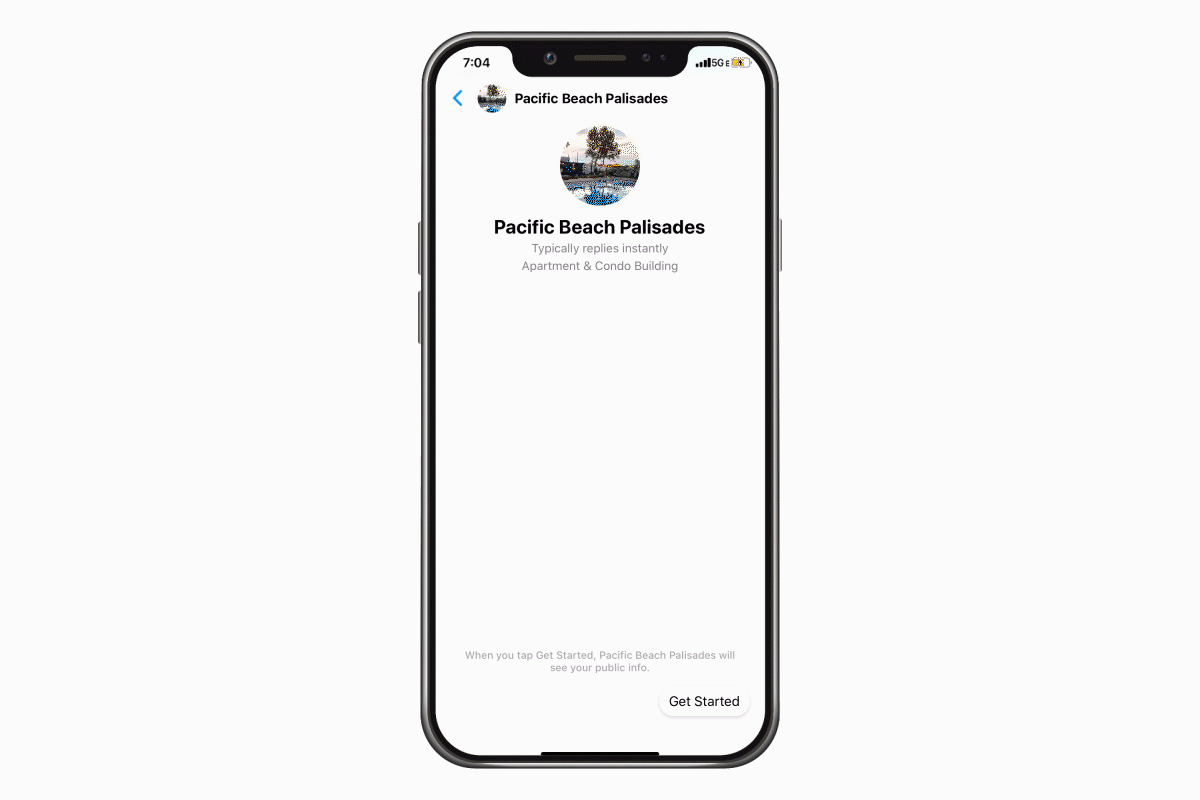
6. Collect Data and Customer Insights
Chatbots can also provide a wealth of data and knowledge. These data insights should influence your marketing, sales, and customer support strategies. Additionally, data from chats should impact your products and services as well as your future chatbot marketing strategy. More on how to collect and leverage data from your chatbots in the following sections.Tips to Get the Most Out of Your Chatbot Marketing
1. Define Goals and Establish a Baseline
In general, chatbots are either delivering customer care or helping with lead generation. Often, chatbots do both simultaneously. To help set a benchmark, ask yourself:- What are customers’ most frequently asked questions?
- After conversations, where should users end up in the marketing and sales funnel?
- When does customer support need to step in?
- Are your chatbots tyring to collect leads?
- Will chatbots reduce your teams’ workload?
- Can you gain consumer insights with chatbots? If so, which insights are more important?
2. Implement Conversation Trees and Branches
With your chatbot marketing goals in mind, consider the customer journey as they interact with your chatbot. Think of your chatbot’s welcome message as an upside-down tree. The way customers respond and your chatbot’s responses are the branches as seen in the image below.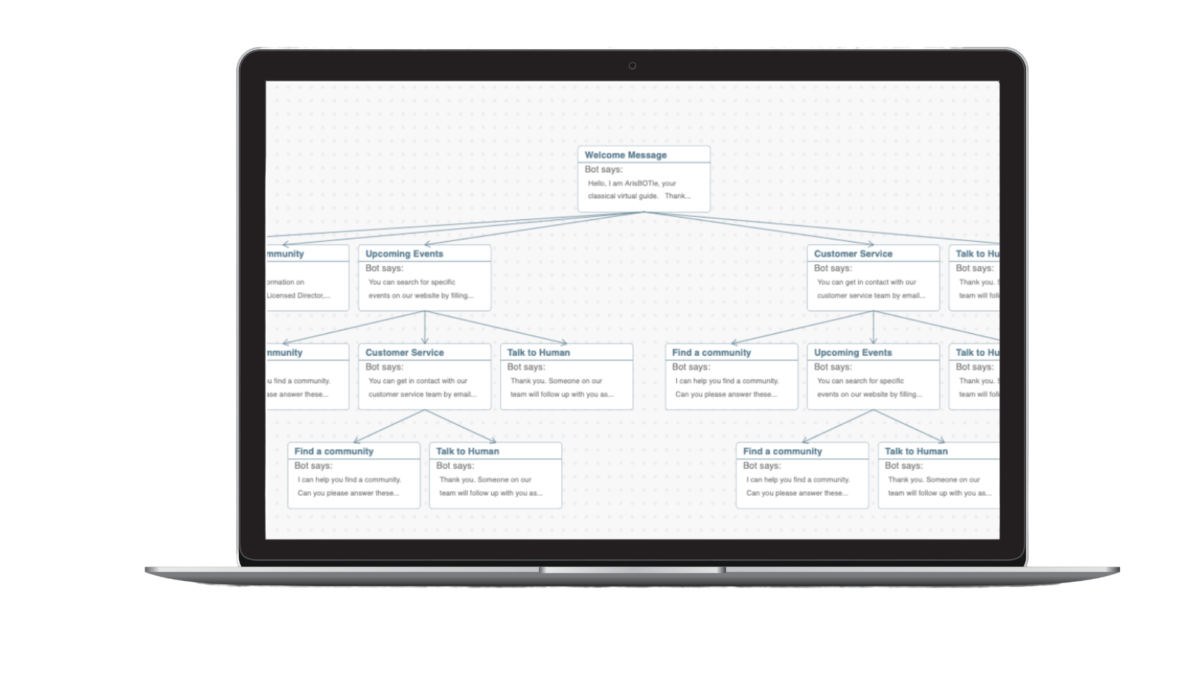
3. Offer Live Chat
Sometimes, you need a human touch. If you have customer service agents available, make them easily accessible by giving consumers an option to talk to a person. If you don’t have the customer support staff, let consumers know when and how they’ll hear back from a human if they go that route. Here’s an example: “I’m sorry we couldn’t resolve your issue at the moment. Please send us your email address, and one of our customer support representatives will reach out to you within the next 24 hours.” Note, as your chatbots have more conversations and you gain more data, you can build out your conversation trees, and you won’t need as many human interactions.4. Collect Customer Feedback and Data
We recommend ending chats with a quick survey question. Not everyone will take the survey, but those who do provide invaluable customer feedback. For example, your chatbot can send a one or two-question customer satisfaction (CSAT) survey, such as, “On a scale of 1-10, ten being extremely satisfied, how satisfied were you today with your chatbot experience?” You can also send a customer effort score survey, “On a scale of 1-5, five being a lot of effort, how much effort did it take to resolve your issue today?” These survey questions will give you quantitative data to help you understand which issues your chatbots are quickly helping resolve and which need modification.5. Capture Contact Information
You can also ask also use chatbots as a lead form to capture contact information. For instance, when a conversation with a chatbot begins, your chatbot can request a user’s name and email address, in case the chat gets disconnected. Similarly, if a chatbot can’t readily answer a consumer’s question, the chatbot can collect the consumer’s contact information so someone from your organization can promptly follow up with answers. Remember, the more opportunities your chatbot solution has to capture contact information, the more leads you can convert.6. Allow Chatbots to Influence Your Products and Services
Earlier, we explained that you could use previous chatbot conversations and data to influence future conversation branches. You should also use historical data from your chatbot conversations to influence your product and services. For instance, if you’re a restaurant, perhaps you see repeated questions and conversations regarding your vegan or gluten-free options. This indicates that this information isn’t easy to find. To help resolve this issue, you should highlight these food options on your online menu or each location’s local landing page. While we’ve covered the basics, for more tips on what chatbots can do for your multi-location business, download our Localized Chatbot Guide.Companies With Impressive Chatbots
Currently, 80 percent of companies worldwide use chatbots. If you’re not using chatbots, your competitors likely are, and they’re gaining more leads and satisfying customers with them. Below are two multi-location companies that implemented SOCi’s chatbot software, SOCi SmartBot.Case & Associates
Case & Associates Properties, Inc. is a property management company (PMC) with nearly a hundred locations across the United States. During a 60-day test across five properties, Case & Associates increased leads by 45 percent with SOCi SmartBot. Moreover, Case & Associates responded to 3,000 inquiries from more than 700 people. Here’s an example of a chatbot conversation at one of Case & Associates’ properties.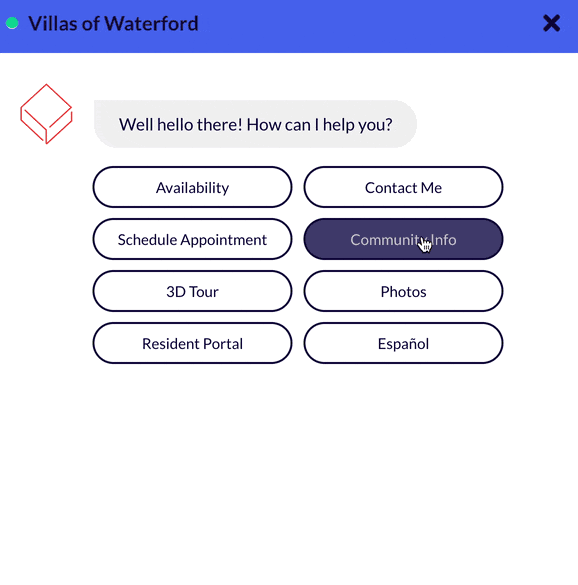
Dinosaur Bar-B-Que
Dinosaur Bar-B-Que is a restaurant brand with multiple locations throughout the state of New York. Managing a restaurant, kitchen, and online customers is no easy task. SOCi SmartBot helped alleviate some pressure by answering online consumers' inquiries.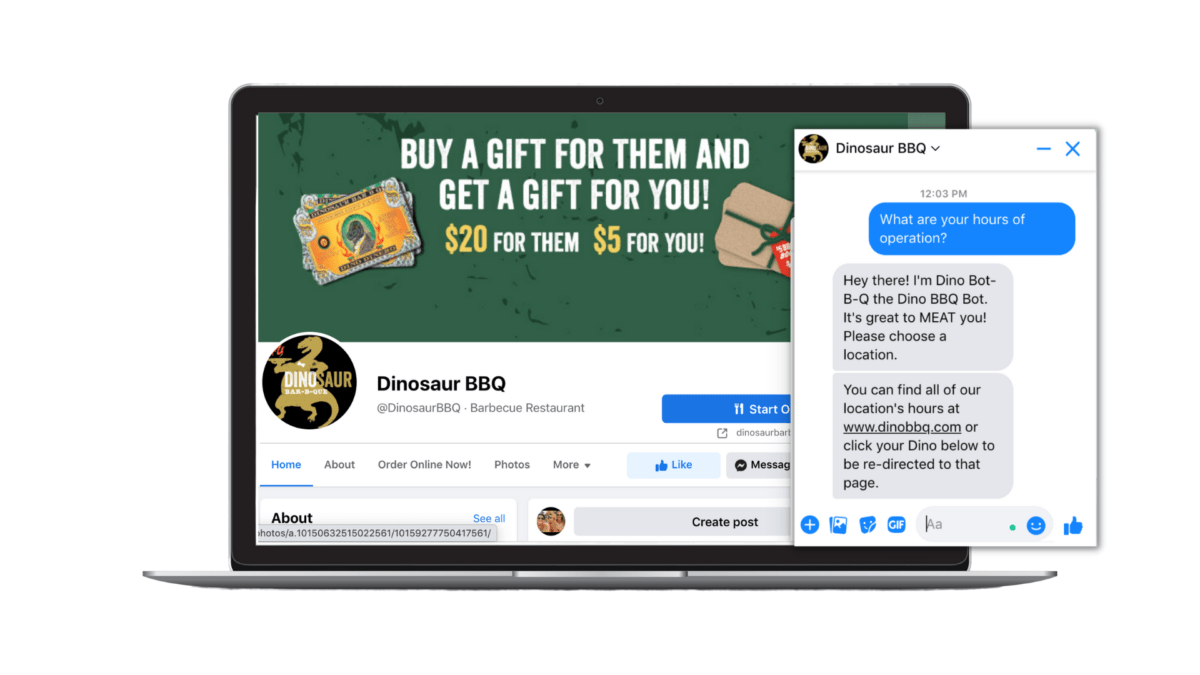 In one year, SOCi SmartBot helped Dinosaur Bar-B-Que handle over 118,000 messages. Furthermore, 98 percent of all messaging inquiries were responded to by the bot.
In one year, SOCi SmartBot helped Dinosaur Bar-B-Que handle over 118,000 messages. Furthermore, 98 percent of all messaging inquiries were responded to by the bot.
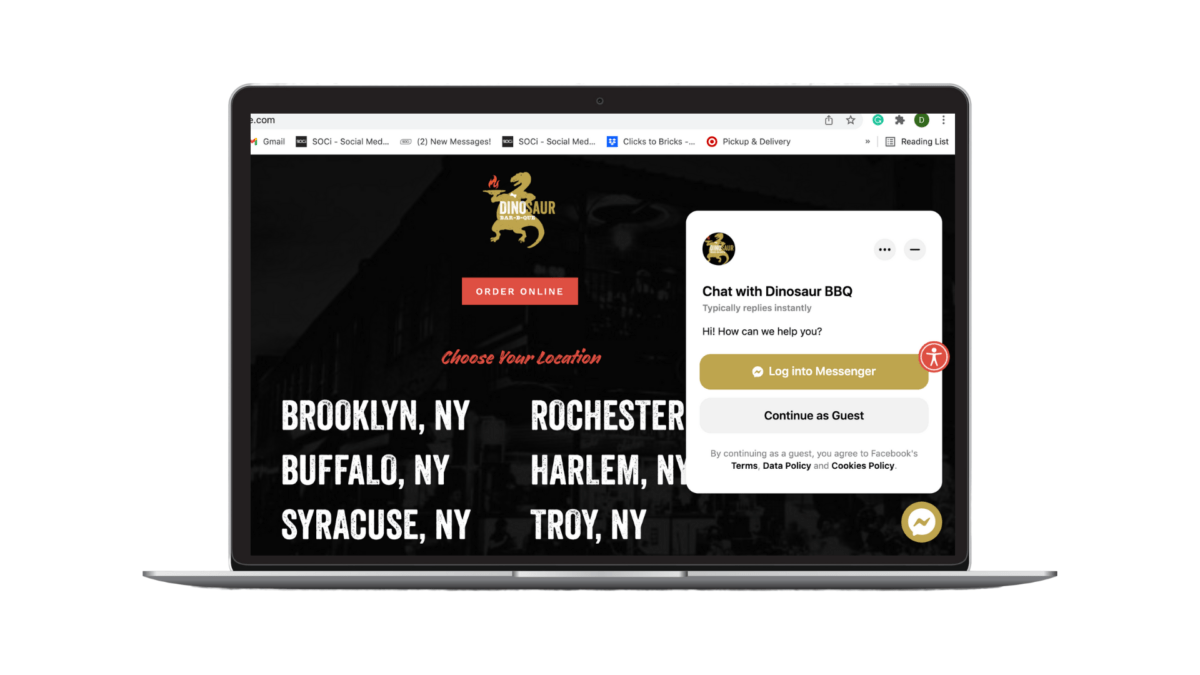
The Chatbot Built for Multi-Location Companies
Chatbots have a lot of varying capabilities. Therefore, it’s essential to choose one that fits your business needs. For multi-location businesses, we recommend SOCi SmartBot. SOCi SmarBot integrates with Facebook, Google Business Profile accounts, and SMS messaging so users can reach you across multiple platforms at each location.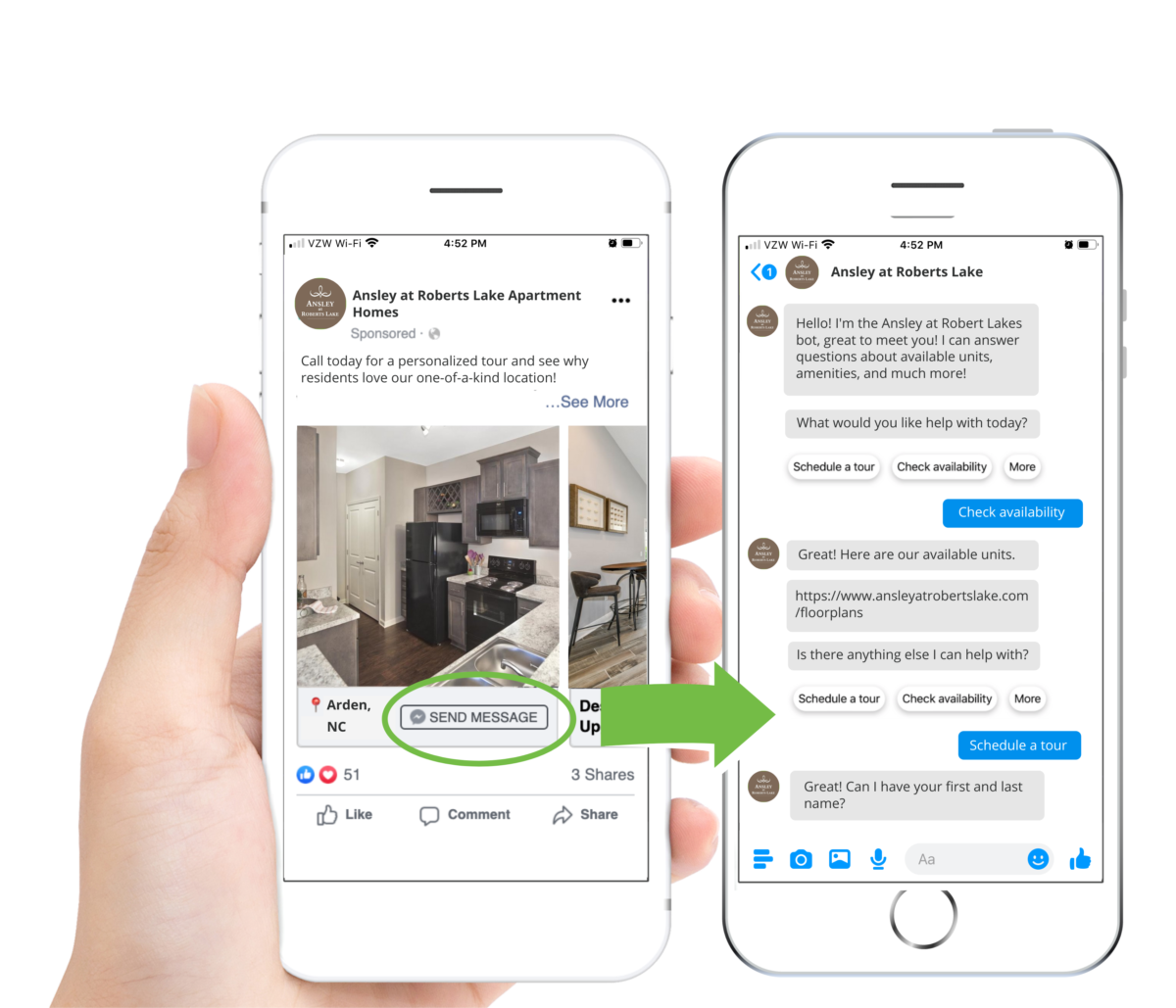 As you can see from our multi-location clients, SOCi SmartBot can help improve your chatbot marketing, generate more leads, and improve your customer support.
Turn consumers’ questions into conversations with SOCi SmarBot. To learn more, request a demo today!
As you can see from our multi-location clients, SOCi SmartBot can help improve your chatbot marketing, generate more leads, and improve your customer support.
Turn consumers’ questions into conversations with SOCi SmarBot. To learn more, request a demo today!









